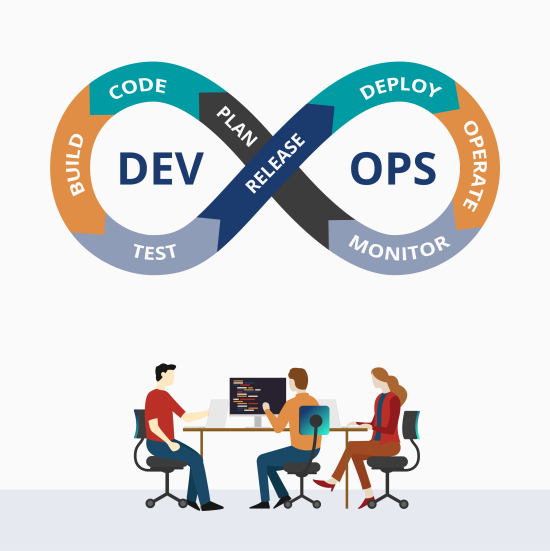Devops
An increasingly blurred boundary between developers and operations managers
DevOps is a software development methodology that aims at communication, collaboration, integration, visibility and transparency between developers and "systems engineers" with the aim of making the passage of an idea from the development phase to the deployment phase in a faster way , with superior quality, at a lower cost and at a high frequency of releases.
Two different worlds but ever closer: devops and developers
The term "DevOps" comes from the combination of two terms: "Development" and "Operations". DevOps outlines the best practices to be adopted to speed up the processes that allow a concept to move from development to deployment in a production environment, where it can provide value to the user. Such approaches require frequent communication between operations and development teams.
DevOps allows you to combine existing applications with the most modern infrastructures and cloud native apps.
The devops model allows you to automate checks on the security of applications and the configuration of the infrastructure. Tools like Jenkins and Terraform help operators automate workflows.

Advantages
The Devop methodology is important as it allows dev and ops teams to unite and work together, with the consequence of creating high quality products quickly and achieving greater customer satisfaction.
Continuous integration/delivery (CI/CD)
One of the main outcomes of DevOps implementation is the Continuous Integration and Deployment (CI / CD) pipeline, which allows continuous verification that application and infrastructure updates are in line with quality standards to ensure end-user reliability. with manual interventions reduced to a minimum.
Despite the automation of operations, we usually review all existing business architectures and implement improvements where necessary.


What do we do?
- Infrastructure as Code (IaaC): we generate cloud infrastructures using code
- Platform as a Service (PaaS): we install and manage software on existing servers (package installation, service startup, installation of scripts or configuration files)
The key features can be summarized in four steps:
1. Planning and measurement
- Planning
- Process management
- Monitoring
2. Development and testing
continuously verifies that application and infrastructure updates are in line with quality standards.
- Writing code
- Analyses
- Version control
- Build
- Verify the Build
3. Release and optimization
the use of agile processes allows us to be faster in the development of the application and better adapt to changes in customer needs and eliminating waste.
- Automated functional test environment
- Integrated test environment
- Pre-production environment
- Staging environment
4. Monitoring and Optimization
continuous monitoring and analysis of feedback from internal and external customers
- Monitoring
- Feedback
Do you have a project in mind?
Contact us in order to understand how we can help you to realize it.